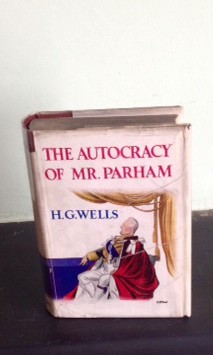Inspiring Older Readers
 posted on 17 Sep 2015
posted on 17 Sep 2015
The Autocracy of Mr. Parham by H.G.Wells
This is really something of a little oddity. I have to admit that before I stumbled over this Wells novel, published in 1930, I had never heard of it. Wells was prolific and I find his output hugely variable in terms of quality. I wouldn’t put this anywhere near the top rank of his works but I do think it’s a pretty quirky and ultimately entertaining squib.
The book is a product of its time and Wells’ own political perspective. Essentially it’s a satire of right wing political fantasies of dictatorship – prevalent in the British Establishment at that time in our history – and a chance for Wells to draw some pretty unflattering profiles of some of the big political figures of the day. Beaverbook and Oswald Moseley are clear targets and I think there must be several others that I have failed to spot because my knowledge of the political scene in 1930 is pretty limited.
The story is preposterous but that isn’t something Wells was worrying about. Mr Parham is a rather damp university lecturer with right-wing sympathies who is looking for a ‘new industrialist’ who will fund his fantasy of starting up a political journal that will allow him to become influential and sought-after. He latches onto Sir Bussy Woodcock, the brash industrialist who turns everything he touches to gold.
Woodcock (Beaverbrook) is, however, a social and intellectual butterfly constantly looking for new thrills and becomes enraptured by the fad for spiritualism – a world he draws Parham into. During one of an endless series of séances, Parham finds his body and soul inhabited by the spirit of an entity calling himself Lord Paramount – a charismatic Fascist who manipulates a coup in the UK Parliament and takes power. Paramounts expansionist urge leads him to declare war on the USA – a battle that goes badly for Britain. In an attempt to turn his fortunes around, Paramount resorts to trying to prise a noxious poison gas (Gas L) from the industrialists who control its production and he mounts an attack on them...............
At this point, Wells resorts to that age old schoolboy trick – he woke up and discovered it was all a dream. Parham has in fact fallen asleep in the séance and awakes from his fantasy to discover that all of his dreams are nothing more than that – even his dream of a journal melts away as Sir Bussy makes it clear he never had any intension of funding Parham’s most treasured fantasy.
The messages are all upfront and the moral pretty much socks you on the jaw. Not that the message is a bad one – this was probably an important set of views to be delivering at a time when Mussolini and Hitler were just on the rise and the British aristocracy and monarchy were openly talking about their admiration for Fascist populists.
The book I read, published in 1930 by Heinemann, also has the added benefit of double page spread black and white illustrations by David Low.
Terry Potter
September 2015